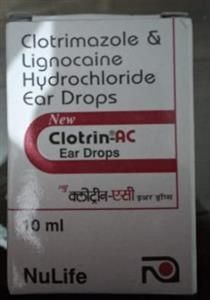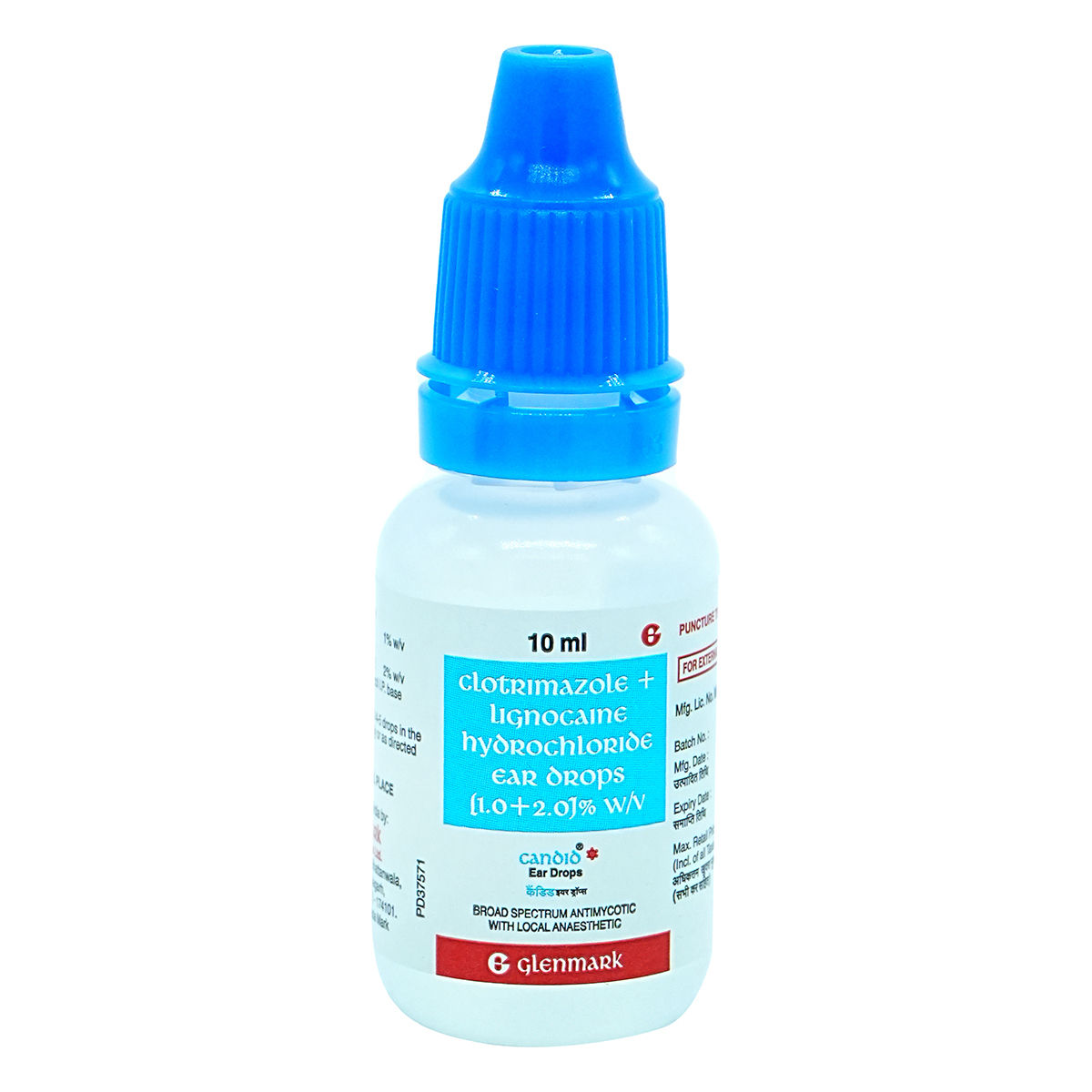Clotrimazole+lidocaine
About Clotrimazole+lidocaine
Clotrimazole+lidocaine belongs to a group of medications known as antifungals, used to treat fungal infections. Fungal infection occurs when a fungus invades and affects the tissue in the body. Symptoms of a fungal infection include rash, irritation, redness and scaling of the skin.
Clotrimazole+lidocaine is composed of two medicines: Clotrimazole (antifungal) and Lidocaine (local anaesthetic). Clotrimazole is an antifungal medication that works by stopping the growth of fungi by causing damage and leakage to the fungal cell membrane. Lidocaine belongs to the class of local anaesthetics. It reduces pain by blocking the pain signals from nerves to the brain. It causes temporary numbness/loss of feeling in the skin and mucous membranes.
Your doctor will advise the appropriate dose that suits your infection. If the medicine gets into your eyes, nose, mouth or vagina, rinse with cold water. Clotrimazole+lidocaine has common side effects like itching, dryness, redness, and burning sensation at the application site. Most of these side effects do not require medical attention and gradually resolve over time. However, if the side effects persist or worsen, please consult your doctor.
Let your doctor know if you have any allergic reactions to Clotrimazole+lidocaine or any other medications. Please check with your doctor before using Clotrimazole+lidocaine, if you have severe liver disease, heart and kidney diseases, and blood disorders (methemoglobinemia, a condition in which less oxygen is delivered to the cells). Pregnant and breastfeeding mothers should consult the doctor before starting Clotrimazole+lidocaine. If nursing mothers apply Clotrimazole+lidocaine to their breasts for treatment, it is advised to wash the affected area thoroughly before breastfeeding the baby.
Uses of Clotrimazole+lidocaine
Medicinal Benefits
Clotrimazole+lidocaine is used to treat fungal infections and consists of two medicines, namely: Clotrimazole (antifungal) and Lidocaine (local anaesthetic). Clotrimazole is an antifungal medication that treats fungal infections like vaginal yeast infections, oral thrush, and ringworm. It stops the growth of fungi by causing damage and leakage to the fungal cell membrane. Lidocaine is a local anaesthetic that reduces pain by blocking the pain signals from nerves to the brain. It causes temporary numbness/loss of feeling in the skin and mucous membranes.
Directions for Use
Storage
Side Effects of Clotrimazole+lidocaine
- Itching
- Dryness
- Redness
- Burning sensation at the application site
Drug Warnings
Before using Clotrimazole+lidocaine, let your doctor know if have a history of liver diseases, heart, kidney diseases, blood disorders (methemoglobinemia, a condition in which less oxygen is delivered to the cells) or allergic reactions to Clotrimazole+lidocaine and its components. Do not apply Clotrimazole+lidocaine to blisters, cuts, wounds or lesions. Do not smoke or go near naked flames since fabric (clothing, bedding, dressings) that has been in contact with this product burns easily and is a serious fire hazard. Let your doctor know if you plan to become pregnant or already pregnant and a lactating mother. If you apply Clotrimazole+lidocaine to breasts or nipple for treatment, wash it off while nursing your baby.
Drug Interactions
Drug-Drug Interaction: Clotrimazole+lidocaine may interact with respiratory-related medicines (budesonide, formoterol), pain killers (acetaminophen, hydrocodone), and local anaesthetics (prilocaine). Clotrimazole in Clotrimazole+lidocaine may reduce the effectiveness of latex contraceptives. The patient should be advised to use alternative precautions for at least five days after using this product.
Drug-Food Interaction: No drug-food interactions were found/ established. However avoiding fatty foods, alcohol, and caffeine can effectively manage fungal infections.
Drug-Disease Interaction: Brief your doctor if you have a medical history of allergic reactions to medicines, other skin infections, severe liver disease, heart and kidney diseases, and blood disorders before taking Clotrimazole+lidocaine.
Drug-Drug Interactions Checker List:
Safety Advice

Alcohol
safe if prescribedNo interaction found/ established. Please consult your doctor before using Clotrimazole+lidocaine.

Pregnancy
cautionPlease consult your doctor if you are planning to become pregnant or already pregnant before starting Clotrimazole+lidocaine.

Breast Feeding
safe if prescribedThere is limited data on how Clotrimazole+lidocaine affects breastfeeding. Clotrimazole+lidocaine is generally safe to use when prescribed by the doctor during breastfeeding. However, if nursing mothers apply Clotrimazole+lidocaine to their breasts for treatment, it is advised to wash the affected area thoroughly before breastfeeding the baby.

Driving
safe if prescribedClotrimazole+lidocaine has no or negligible influence on the ability to drive or use machines.

Liver
cautionLet your doctor know if you have any history of severe liver diseases or hepatic impairment before starting Clotrimazole+lidocaine.

Kidney
cautionLet your doctor know if you have any history of kidney diseases before starting Clotrimazole+lidocaine.

Children
cautionClotrimazole+lidocaine is to be used on children below 12 years of age only when prescribed by the doctor.
Habit Forming
Diet & Lifestyle Advise
- Always wear loose-fitting clothes to avoid further sweat and the spread of the fungal infection.
- Do not scratch the affected area of the skin as it can spread the infection to other body parts.
- Avoid sharing towels, combs, bedsheets, shoes or socks with others.
- Wash your bed sheets and towels regularly.
- Wash your socks, stockings, and tights in hot water regularly. Avoid shoes that make your feet sweaty and hot.
- Do not walk barefoot at places like gym showers to prevent fungal infections.
- Avoid or limit the intake of alcohol and caffeine.
Patients Concern
Disease/Condition Glossary
Fungal infection: A fungal infection occurs when a fungus enters, infects, and multiplies in the body. Fungi can live in water, soil, air, and plants. Fungi affect any part of the body, including the mouth, throat, oesophagus, lungs, bladder, genital area, and blood. Mild fungal skin infections are common and can cause rashes. Fungal infections affecting body organs like the lungs can cause flu or tuberculosis. Some fungal diseases like cryptococcal meningitis and blood infections can be fatal. A few common fungal infections are yeast infections that affect the genital area, oesophagus, and urinary tract caused by the species Candida.
Athlete's foot: It is a fungal infection between the toes due to sweating.
Jock itch: A fungal infection in the skin of the genitals, inner thighs and buttocks.
FAQs
Clotrimazole+lidocaine is used to treat fungal infections.
Clotrimazole+lidocaine consists of Clotrimazole and Lidocaine. Clotrimazole, an antifungal drug, stops fungi growth by causing damage and leakage to the fungal cell membrane. Lidocaine is a local anaesthetic that relieves pain sensation in the affected area.
Do not put bandage or dressing on the affected area while treating with Clotrimazole+lidocaine unless the doctor advised. If the ointment/cream/lotion/powder form gets into your eyes, nose, mouth or vagina, rinse with cold water.
Please consult your doctor before using Clotrimazole+lidocaine if you have other skin infections, severe liver disease, heart and kidney diseases, and blood disorders (methemoglobinemia, a condition in which less oxygen is delivered to the cells). Let your doctor know if your allergic to Clotrimazole+lidocaine or any of its components.
You are required to maintain at least a three-hour gap after application of Clotrimazole+lidocaine if you are using more than one topical medicine.









